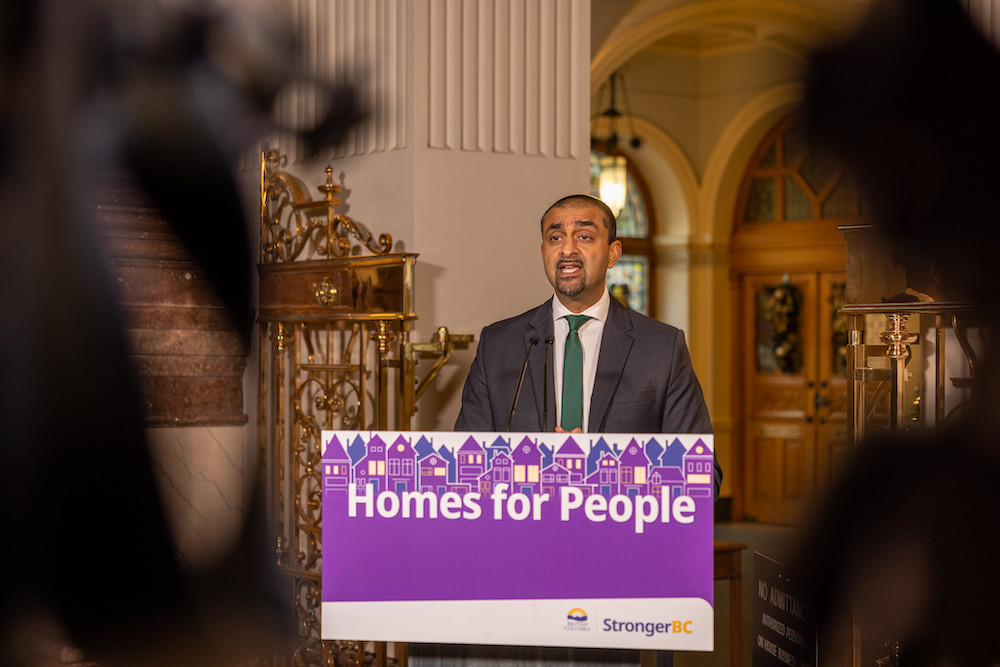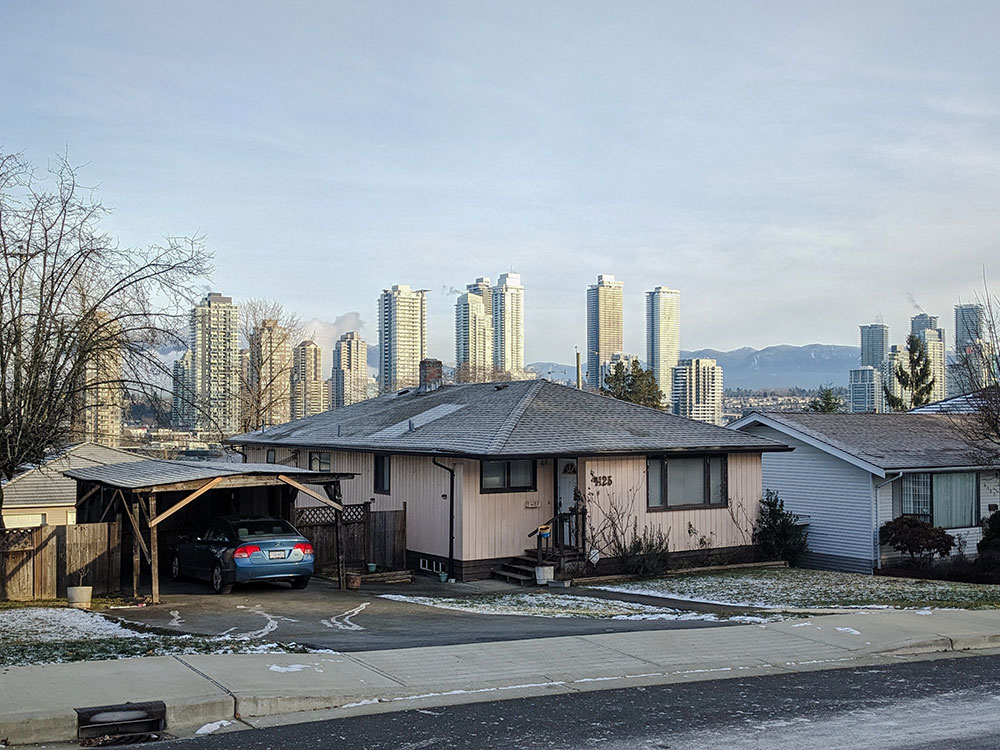Zoning, densification, permitting — this is the traditional work of municipalities.
But if you ask today’s provincial and federal governments, they’ll say local development is happening too slowly. So they’ve decided to step in.
In the past few months, the senior governments have flexed their powers with new policy and programs to push cities to grow.
“It is a significant shift,” BC NDP Housing Minister Ravi Kahlon told The Tyee. “The housing system as we have it now is not working.”
Kahlon mentioned the long delays to approve needed homes in many communities, referencing the District of North Vancouver, where residents recently debated a six-storey supportive housing project to be managed by the Lu’ma Native Housing Society. The public hearing for that project became the longest in the community’s history.
“That’s why we brought in the legislation that we have, because it’s about reforming the system,” said Kahlon.
He’s referring to the big changes that the province introduced last fall to expedite the process of building more housing. The legislation permits up to four units in single-family zones and an end to public hearings for rezonings already compliant with community plans.
While B.C. municipalities acclimatize to the provincial reforms, the federal government, on the other hand, is dangling millions of dollars as a reward for municipalities with ambitious plans to speed up growth in the form of its Housing Accelerator Fund.
Even more is on its way in 2024, from finer zoning tools to catalogues of standardized home designs.
Housing advocates have been calling for more help from senior governments ever since the austerity of the early 1990s.
However, with three cooks in the kitchen — municipalities, the province, the federal government — some tensions have emerged.
A double portion of housing help
“It’s clearly a break from what we’ve seen in the past,” said Stewart Prest, a political scientist at the University of British Columbia.
“It’s a response to the reality that the cost of housing affects all of B.C.... [and] this is an issue that has national implications.”
The BC NDP has been ramping up involvement in the municipal arena for a few years, mandating cities to document what types of homes aren’t being built and setting growth targets for a few that have been placed on what media have called the “naughty list.”
Then in November, the province introduced the legislation that will effectively end single-family zoning, calling it “outdated.”
Up to four units will be allowed in single-family and duplex zones; up to six will be permitted in those near public transit hubs.
The reforms have staff at city halls across the province rushing to understand the ramifications on their pre-existing plans. Some politicians critical of the moves have called them “irresponsible,” while others say they’re “uncomfortable” but necessary.
The province isn’t putting an end to public hearings for all rezonings, only those projects that are already in step with what community plans want for an area. The province says there will be more opportunities for residents to offer their input in the crafting of those community plans.
“Here’s a way to short-circuit some of those tools of infinite delay,” said Prest. “Housing has been one of those issues where people are broadly supportive of the idea of action, but every particular action has something wrong with it, and so nothing ever gets done.... This is a way of not just levelling the playing field, but reorganizing it.”
B.C. joins a number of senior jurisdictions that have used their powers to override local ones to speed up the delivery of housing, with the province referencing New Zealand reforms in 2016.
On the federal front, the Liberal government started announcing the recipients of its $4-billion Housing Accelerator Fund last fall. Among them are Vancouver, Kelowna, Calgary, Brampton and Halifax.
Millions of dollars will go to cities that are developing different types of housing supply and building low-carbon communities. The federal government is interested in everything from speeding up approvals to waivers for affordable housing developments, lowering parking requirements and encouraging “missing middle” building types between houses and towers.
Federal Housing Minister Sean Fraser has been challenging municipalities to be “ambitious” and evolve. Of those that don’t want to tweak their existing zoning, he recently said he “knows who some of them are and maybe they’ll change their ways,” iterating that no changes means no funding.
Toronto is one city he has challenged with a to-do list, and staff are hurriedly making changes to their policies in order to qualify for the funding.
However, the competition has also resulted in some drama.
Some local governments are debating whether or not committing to growth is worth the money.
This fund has also resulted in what some provincial premiers, who met at November’s Council of the Federation, are calling “jurisdictional creep.”
B.C. Premier David Eby has expressed that it is an “irritant” that the federal government might be funding cities that aren’t on a provincial priority list.

City halls digest the changes
Burnaby, B.C.’s third-largest city, likes to think of itself as a leader in growth and housing. Some of the city’s strategies are what the province has now introduced for all municipalities.
“It’s a difficult pill to swallow because I think we’ve done a really good job of densifying,” said Mayor Mike Hurley. “This has been a bit of shock and awe over the last couple of months as we’ve all been trying to absorb what it actually means.”
When the province announced its reforms, the city had already been consulting with residents on densification as part of a program called Housing Choices, which is now effectively terminated. Much of what Burnaby had approved will still be applicable, but the provincial changes mean that some of the groundwork has been made “redundant,” said Hurley.
“In some cases, it’s the right thing to do. I just wish it could have been done in a more organized fashion.”
While there was some consultation with cities, Hurley said it consisted of the province telling them “this is what we’re going to do.”
Burnaby was also one of the first cities to submit their application for federal money from the accelerator fund.
But on the day of the September funding announcement for Burnaby and Surrey, federal Housing Minister Sean Fraser pulled the plug at the last minute, pausing to review how a regional levy on development might impede it.
That revenue was to help pay for the infrastructure required for new growth, argued the region’s mayors. One of them, Brad West of Port Coquitlam, said the federal government’s holdup of funds is “akin to a hostage-taking.”
A majority of the mayors stood firm on keeping the levy, called development cost charges.
In response, Minister Fraser dialogued with cities and the federal funds are once again being awarded to Burnaby and others.
“The minister is a good guy and I know he means well,” said Hurley. “I’m hoping there’ll be a way to smooth all this out and do it in a more organized fashion as we move forward.”
More in 2024
Come spring, the BC NDP government will be introducing another piece of legislation around inclusionary zoning, which mandates that a certain type of housing must be built in that zone.
“It’ll vary for communities,” said Minister Kahlon. “We’re going to be working to enable tools for local governments to put that in place.... It matters community by community on what they’re trying to achieve.”
It could be requiring a percentage of non-market units or two-to-three-bedroom homes, he added.
Burnaby currently uses this tool in town centres like the Metrotown area to mandate that 20 per cent of the units in a project be below-market rentals.
Then in the summer, the province will be revealing a selection of standardized designs for multiplexes, townhouses and laneways. The intent is that cities will be able to approve these quickly and at a cheaper cost for those building them.
The federal government also has standardized designs in the works, hearkening back to postwar “victory homes.” Currently B.C. is much further along on the initiative, and Kahlon said there are currently talks about collaboration.
With all the new changes, Kahlon announced this week that $51 million in grants will be available to help municipalities keep up with them.
But what will some of these zoning reforms look like on the ground?
For many years, true “single-family zoning” has already been done away with in parts of Vancouver like Norquay Village that have numerous secondary suites, laneway houses and a growing stock of stacked townhomes and mid-rises.
But elsewhere, municipalities anticipate that it’s going to take some time for the development industry to process what’s possible under the changes before shovels hit the ground.
All in all, Kahlon’s hope is that the province’s housing legislation will help smooth out uneven growth. And these actions will cap off the BC NDP’s time in the legislature before a fall 2024 provincial election.
“What happens often is the communities that are the most willing [to build] end up taking the majority of people,” he said. “My message to all communities is that it’s every community’s responsibility to help us address housing challenges.” ![]()

















Tyee Commenting Guidelines
Comments that violate guidelines risk being deleted, and violations may result in a temporary or permanent user ban. Maintain the spirit of good conversation to stay in the discussion and be patient with moderators. Comments are reviewed regularly but not in real time.
Do:
Do not: